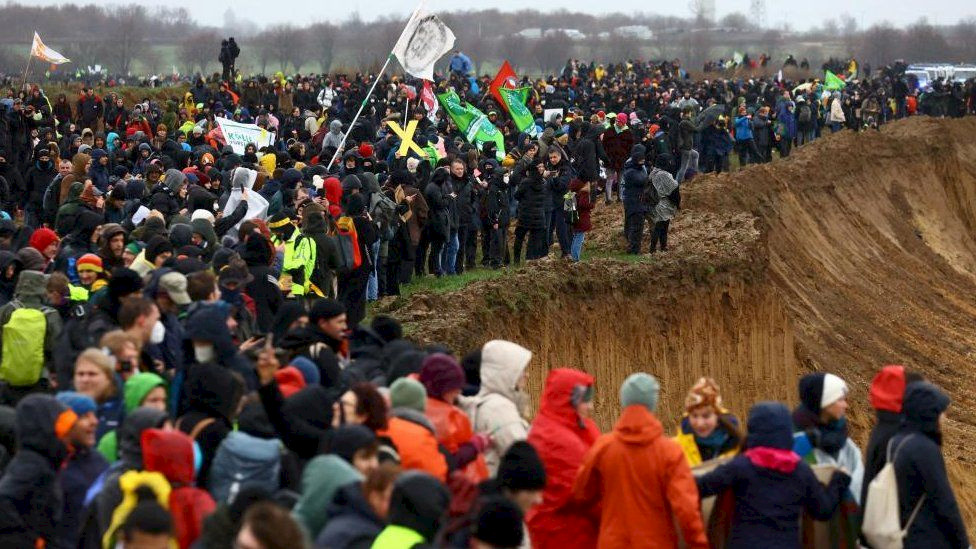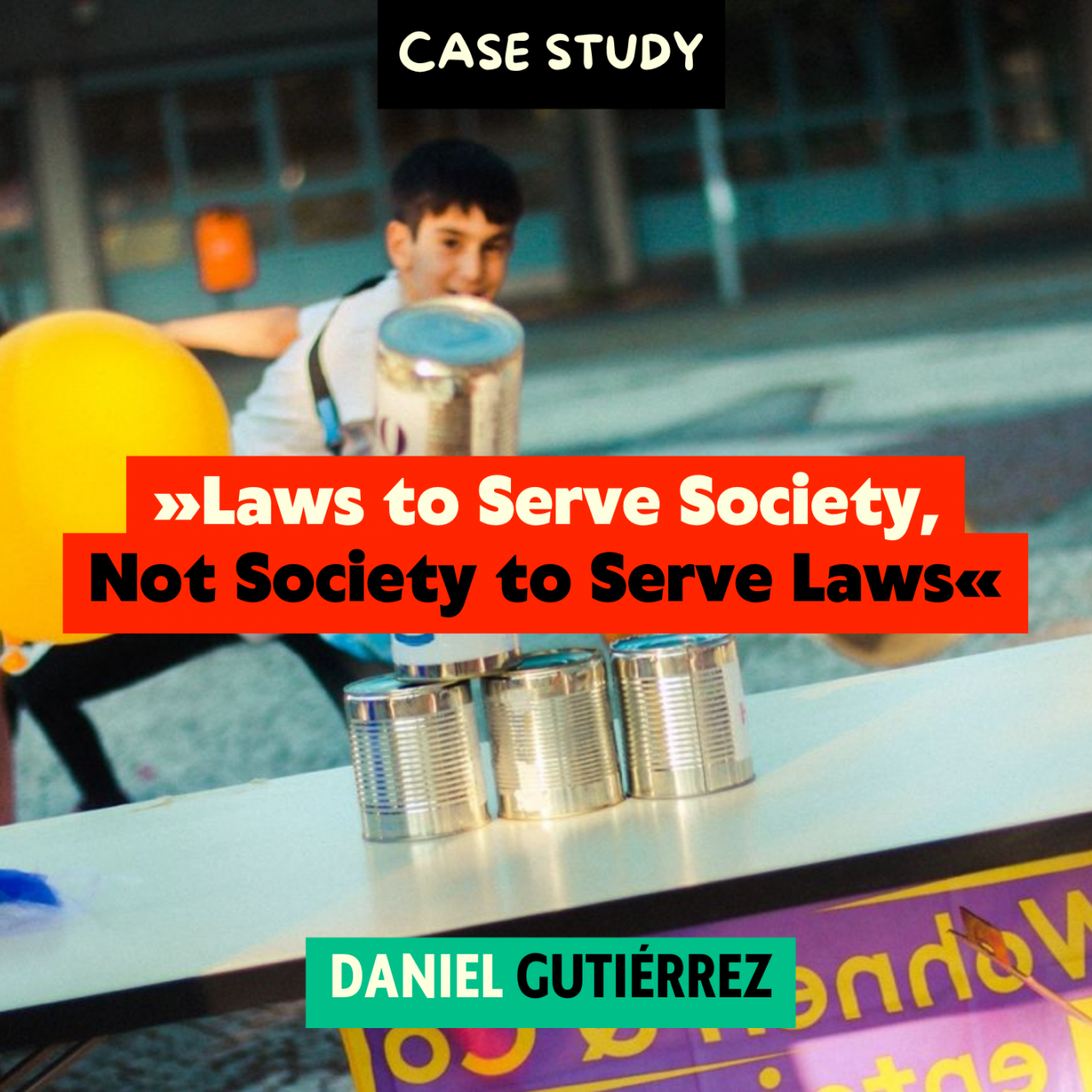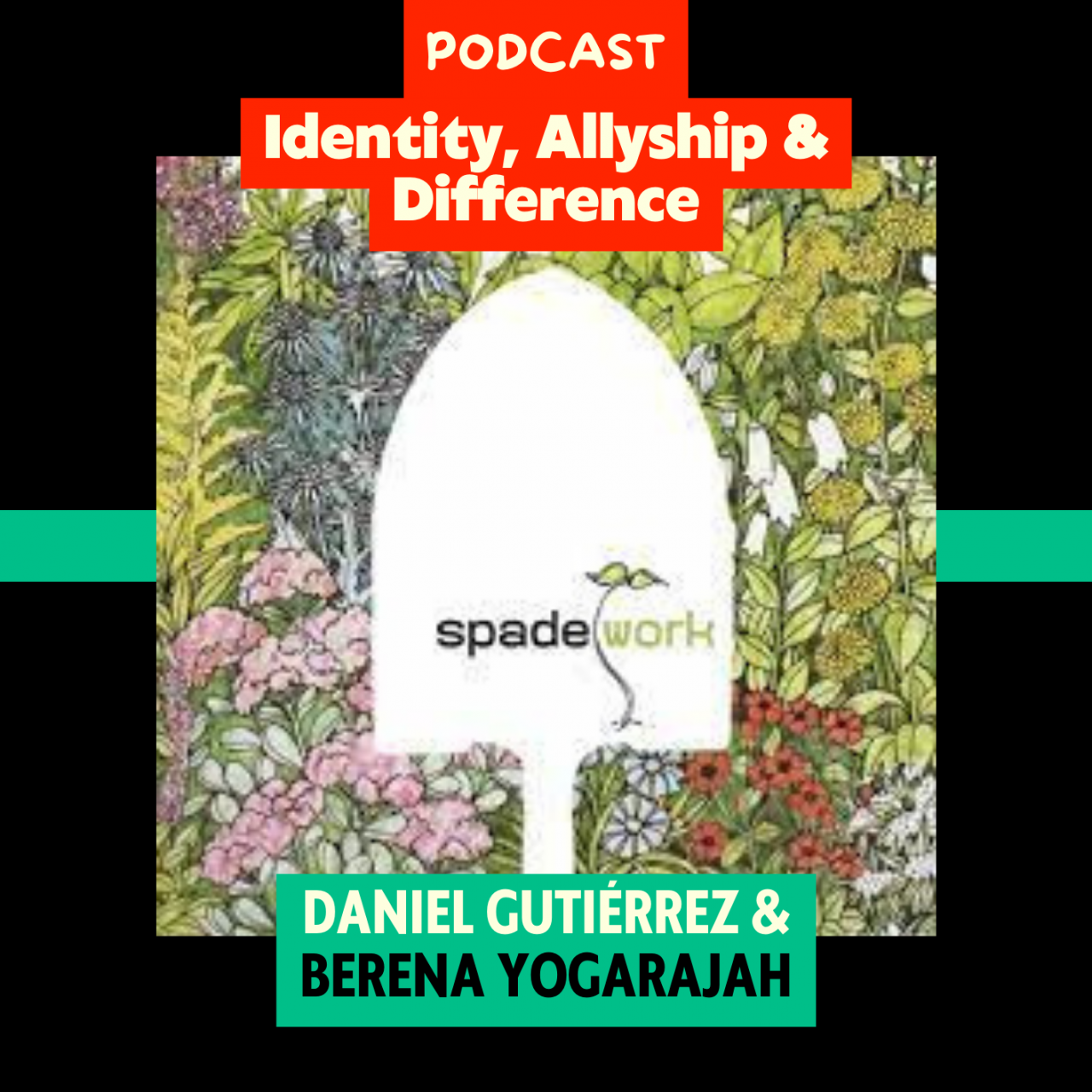From the experience of my involvement in the climate justice movement and the trade union during the #WirFahrenZusammen campaign 2020, I would like to share three lessons that I have learnt in recent years.
Lesson 1: Climate Anxiety and Urgency Should Not Win Over Patience and Workers’ Solidarity
Various climate justice activists as the climate disobedience group ‘Ende Gelände’ derive a high degree of radicalism in their actions from the urgency at hand. They aim at social awareness-raising, a disruption of everyday life up to (symbolic) blockades of fossil energy production. In the past, these struggles were important, for example, when they were directed against coal companies like RWE in Lützerath.
Climate justice activists trying to defend the village Lützerath in North-Rhine Westphalia (Photo: Transnational Social Strike)
On the other hand, actions directed against the normal population seem to me to make little sense. For example, actions of ‘The Last Generation’ are very often directed against everyday people with the aim of enlightening them about the urgent need to act against the climate crisis. But instead of the latter, these actions evoke anger and incomprehension in many people. In Germany, there have even been reported physical attacks by car drivers against climate justice activists glued to the road. So, we can acknowledge that targeting workers on their way to work may not be the best tactic to empower them and gain supporters for our common cause.
Our aim should be to win everyday people over to a common socio-ecological struggle, not to lecture them from an individualistic and moralistic standpoint. Paradoxically, it is up to us climate justice activists to remind the unions again of the economic, social and political power they actually constitute and how they can use it to our common good.
Despite the urgency of the climate crisis, I would therefore argue for the slow but effective process of building popular power that will lead to big social majorities supporting bold actions for a socio-ecological transformation. As 'Radicality' does not necessarily mean making the most radical demand or breaking the ‘conventional’ rules of everyday life. As fighting the devastations capitalism is causing on our planet is also not done by critiquing consumption and the ideology of consumerism. Instead, it must be about developing demands or building coalitions that help us build the most powerful struggles and the broadest possible movements against global corporations destroying the livelihoods of communities in the ‘Global South’ and the working-classes across the globe. Often the latter also requires a lot of patience.
The struggle for better working conditions in local transportation, for example, is far from being a mobility revolution. However, it is a central step and a starting point for broad-based community organizing and coalition building fighting for democratic control and financing of public transportation and mobility in the long term. This strategic foresight is important, and it keeps us safe from focusing too much on our legitimate anxieties related to the effects of the climate crisis.
Lesson 2: 10% Conflicting Issues Are Okay When 90% Are Unifying Claims
US labor organizing pioneer Jane McAlevey takes the position that when building coalitions between climate justice activists and trade unions, it is crucial to leave the 10 percent conflictual issues (such as fracking or pipeline construction) out of the equation and focus on the 90 percent common ground that unites climate justice activists and workers – infrastructure, public transportation, or energy transition.
With this strategic approach in the pocket, climate justice activists could prove through concrete action that they can be useful in promising sectors to create green union jobs. At the Fridays For Future global climate strike in March 2023, bus and train drivers took part in various cities and even gave speeches on stage. The motto of the climate strike was sharpened to the topic of the mobility revolution. These impressive performances and the unity of activists and workers were only possible because we as climate justice activists built up this campaign together with the trade union and thus gained trust of major parts of the workforce. Only on this basis was it possible to conduct political debates beyond bread-and-butter issues and to address the need for a comprehensive change in local transportation.
Moreover, only concrete alternatives, i.e. well-funded public transportation and other public services of general interest, can also materially detach people from motorized private transportation (cars) or jobs in 'dirty' industries like the automotive and coal industry.
From this perspective, coalition building also means repeatedly identifying common intersections where it is worth engaging in the confrontation with the powerful instead of conflicts with each other, in order to build real power to push for transformations on the collective bargaining and the systemic policy level affecting the lives of all of us climate justice activists, our loved ones, and communities across the globe we are in solidarity with.
These experiences of the many organizing-trained and labor turn-oriented climate justice activists give hope that in the future we can forge really powerful coalitions to break the power of the fossil-fuel industry and to counter the illusion of ‘green capitalism’.
Lesson 3: Making the Climate Justice Movement Popular Requires the Involvement of All Kinds of Different Worker Communities
The process of uniting climate activists and workers holds many memorable moments, but also challenges. Our practical experience has shown that approaching workers at the depots provides a lot of interesting knowledge about local transportation itself (producer knowledge), but also about real social conditions and different social interests, which are important reference points for our own organizing work.
Today, for example, many buses are electrified as a result of modernization and sustainability strategies of the management. This is generally celebrated as a success. However, employees have told us that electrification has made everyday work more difficult in some cases because the technology did not work or vehicle maintenance was more complicated. Such experiences from everyday work sometimes shape workers' awareness of issues such as ecology and climate. We have to take into account these inadequate ‘ecological’ measures on the part of the management and their effect on employees in our campaigns.
In addition, we as climate justice activists have also come to understand that workplaces are not only places of production and confrontation between workers and employers - but also places that are permeated with different occupational groups, social relations between workers, and different roles among themselves. It is therefore important as an ‘outsider’ to listen to the colleagues during the initial contact, to learn to understand the substantive processes in the companies, and also to understand the structure within the workforce. This is the only way to reveal the actual potential, but also the challenges that can then be addressed.
In Leipzig, for example, it was the employees from the IT area who were the pioneers in setting up a union group. The cooperation with these people, who had another view of the transport company, was very exciting and productive. However, there were also many migrant workers from Spain, Romania or Poland who were recruited overnight by the companies due to the high staff shortages. Their experiences at work or their relationship to the union are similar to their German counterparts in many respects, but in many respects also quite different, marked by racism from the management but also from the side of German colleagues.
In order to truly build the climate justice movement into a majority movement, such aspects must be actively addressed and translated into comprehensive intersectional and transnational organizing strategies. Focusing is important, but political work must not become reductionist in the form of empty phrases or ideological doctrines. Especially not when discrimination is a major obstacle to joint organizing in the workplace. Finally, it’s time for a 'convergence’ of labor, anti-racist and climate justice struggles, as justice will only be possible by overcoming the divisions of communities, struggles, and nations which are constantly being put upon us.




